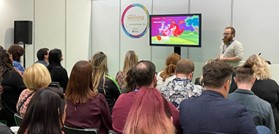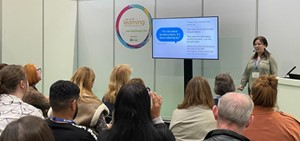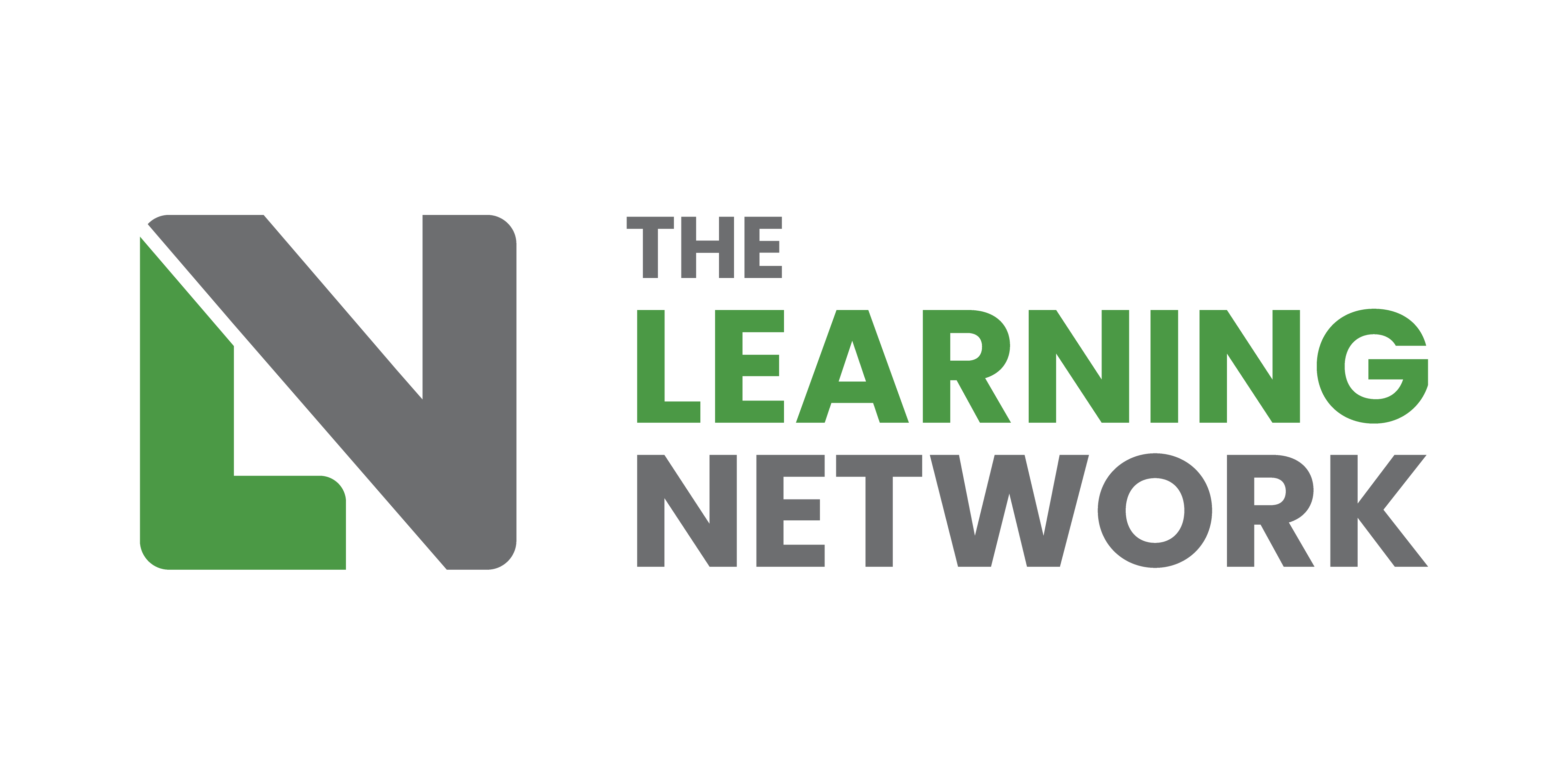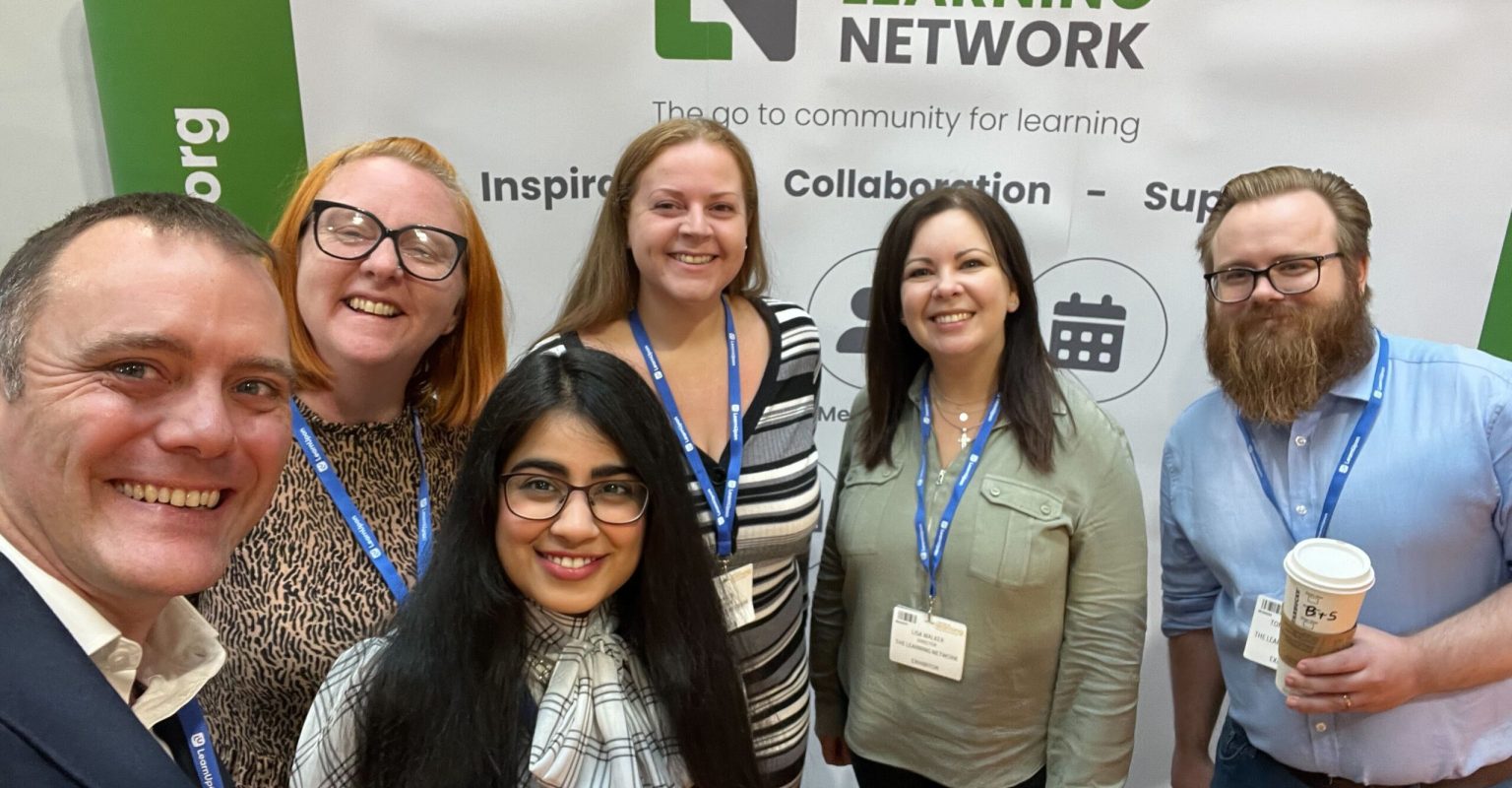After a few years of let’s face it pretty much no face-to-face interaction, the return of large learning development conferences still feels a little bit strange. Having never been a massive fan of massive conference events, I was quite surprised when I realise just how much I’d missed the face-to-face nature of these events.
So, with the Learning Network stand and copious amounts of sanitising products in the car, we headed for the NEC in Birmingham and the World of Learning conference and exhibition. An event that, in my opinion, has always felt more about connection and conversation than about just selling things.
Arriving the night before and walking through the sea of dark blue and imperial green stands that the learning and development industry recognised so well, it was time to set up the Learning Network stand. Needless to say, this went off without a hitch in record time.
With that done there was just enough time for a few quick hellos to some of our fantastic Industry Partners and some of the event team before heading back to up a slightly too-budget hotel for a slightly awkward night’s sleep.
Events like the World of Learning conference are far too large to really get everything in two days especially when you’re also working on a stand. However, I’ve tried to organise my thoughts on the conversations that I had things that I saw, and talks that I heard from here on.
Learning Design Live
This event saw the return of Learning Design Live organised by us at the Learning Network, these talks really focus on the practical how-to side of our industry.
The first session, how to overcome content chaos, by Toby Harris from Filtered was, as expected a masterclass in getting away from content-centric solutions that we are as an industry, still addicted to.
The next session, delivering a robust remote learning solution at low to no cost, by Lizzie Marsden and Naomi Edwards was something you really don’t see at many conferences, with speakers addressing the reality that many internal teams simply do not have a budget when it comes to learning technologies. Their practical advice was some of the best I saw at the event, it’s amazing what you can do with recorded Zoom meetings and Microsoft Teams.
Next up was me, with learning in the flow with video. I won’t go into too many of my bad jokes here, needless to say, there was a dragon, there were Arnold Schwarzenegger quotes, everything you’d expect from me speaking at a totally professional conference.

The next section I was actually able to catch was on the second day when our very own Lisa Walker presented on writing for accessibility. Again, this session was wonderfully practically focused with useful advice that people were able to go away and put into action the very next day.

The overwhelming message I walked away from learning design live with this year, was the need to just try new things. Rather than investing a lot of time and money in trying to prepare, just have a go, make a change and then iterate whether that means creating a new type of content changing how you create content or even not creating content do it and see what happens within reason.
The wider exhibition
I always like to allow plenty of time to have wander around the exhibition at these conference events. I’m very rarely actually in a buying position, but it is very useful to see what’s going on in the industry, what new products are being pushed, or approaches practised.
I was interested to see the growth in the number of virtual reality companies that wrap the event. A few years ago, this seemed to be an incredible niche area of learning technology, but now I counted at least seven stands with virtual reality as their primary offering. Whilst rapid, I’m pushed to ask if this growth is driven more by an excitement around the technology than evidence of its effectiveness. A question that I briefly discussed with our friends at Make Real who will be presenting a fantastic webinar touching on this topic in November (did you notice the shameless plug here?).
Another noticeable change from the last time we were here, is the reduction in content-focused businesses. There seems to have been a shift from organisations primarily pushing content to be off the shelf or designed on a bespoke basis, to platforms or ecosystems. There were a number of LMS and LXP platforms that I had never come across before at the event, many claiming an interesting new take on the learning platform. For my part, I believe competition is good for the industry but that none of the platforms I looked at could really claim to do something that no one else already does.
One thing I did find interesting, was the change in the kind of content businesses that were present. There is a definite focus on how to curate existing content or present existing content in different ways rather than simply generating more and more e-learning content.
Among the more interesting applications of this idea is Get Abstract. They present summaries or abstracts of books whilst also providing pieces on additional context research and really diving into what the benefit is as well as simply providing the information. Others present focused on integrations with platforms such as Teams and Slack with lots of than talking about in-the-flow learning, an ever-popular term but sadly often misused.
All in all, I think this is a good move away from mass piles of e-learning content being created in the industry. There will always be a place for e-learning courses be they short five-minute pieces or long 20-minute pieces of an assessment on the end however, we do seem to be coming to the realisation that this cannot always be the solution. All in all, some very positive trends on display in the exhibition hall.
General conversations and themes
Whilst you can gain a lot from speaking to people on stands and attending seminars, I’ve often found that it’s the hallway conversations or chats around the coffee machines that really impact what you walk away from a conference with. This was certainly the case at this event.
A major theme of a lot of the conversations I had, was an overreliance on technology to solve the problem. I had a lot of conversations with people who were disappointed by the lack of foundational learning principles in a lot of the products being promoted and a lot of the conversations being had. I remember one person remarking that it would be nice to speak to someone who they believed had actually worked in an L&D job at some point in their career.
On reflection, I think this is actually quite an interesting point. We tend to be very quick to get excited about new tools, new platforms, and new technologies in our industry, but we must remember to take the time to make sure that we use them in a way that is helpful to the user and not just exciting for us. Similarly, we must not lose sight of how effective existing technologies and methodologies are as we embrace modern developments.
Community was also a massive theme of this event. Almost everyone I spoke to remarked how nice it was to be talking to people face-to-face again, with many members coming up to the stand just to say hello, put a face to a name, or meet someone, not on a Zoom call. This raised a range of really interesting topics both about how we build professional communities within the Learning and Development world, and how we build learning communities within organisations.
The most challenging part of this, of course, is recognising that you can’t own community and that, if you try, what you will in fact do is kill community. This led me actually to reflect on the strength of the Learning Network as a community for learning and development professionals by learning and development professionals. The make-up of our own Board of Directors, elected from the membership, by the membership, is a really strong reflection of this point.
Summary
After two days of a lot of talk, a lot of walking around and I won’t lie, a lot of standing up, it was time to take down the stand and, after a quick dinner, head home. Taking the time to reflect on the event specifically, and write this article, has been really useful. With so many conversations going on, it can be difficult to know what was important and what was just chat, setting aside an afternoon to just sit and think make some notes draw some ridiculous pictures to remind you a bit later, has really helped solidify what I walked away from the event with.
If you were at the World of Learning conference and exhibition, let us know what your key takeaways were in the member Slack channel. Did you notice similar things to me? Or did you walk away with a very different picture of where our industry is at?



